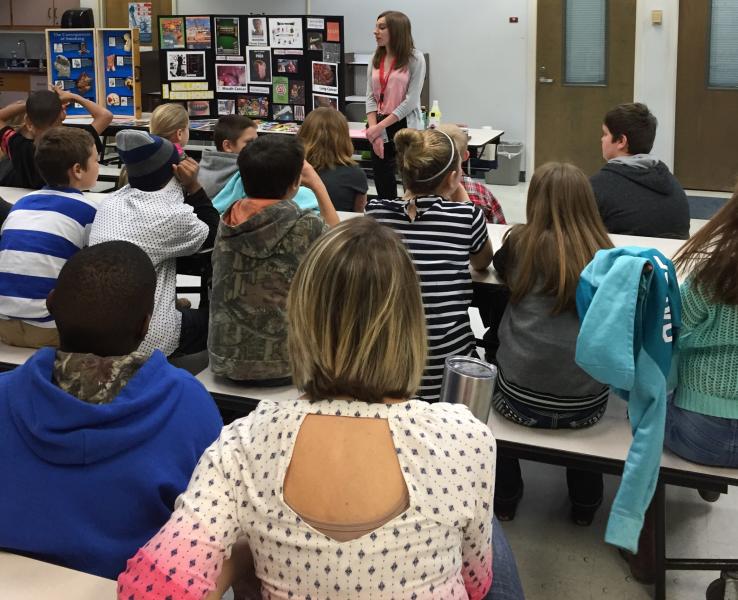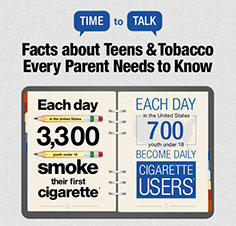Redefining Change
 Last Wednesday afternoon serving as a National Health Corps Florida AmeriCorps member with the Florida Department of Health in Baker County was much like any other. Since I was scheduled to teach my Tobacco Education Group class, I reviewed my lesson plan. From serving in this community, it has become clear to me that tobacco use has been the cultural norm for many generations in Baker County. Therefore, many of the youth in my class do not receive guidance or support in leading a healthy lifestyle from home, their circle of friends, or in some cases, school. My class may be the first and perhaps the last time that this group receives any tobacco education. As I see it, my role in this class goes beyond basic service as an educator. I am a mentor and confidant for youth who most need guidance. That day, I remember asking myself, “How can I use tobacco education to ‘plant a seed’ for the future?"
Last Wednesday afternoon serving as a National Health Corps Florida AmeriCorps member with the Florida Department of Health in Baker County was much like any other. Since I was scheduled to teach my Tobacco Education Group class, I reviewed my lesson plan. From serving in this community, it has become clear to me that tobacco use has been the cultural norm for many generations in Baker County. Therefore, many of the youth in my class do not receive guidance or support in leading a healthy lifestyle from home, their circle of friends, or in some cases, school. My class may be the first and perhaps the last time that this group receives any tobacco education. As I see it, my role in this class goes beyond basic service as an educator. I am a mentor and confidant for youth who most need guidance. That day, I remember asking myself, “How can I use tobacco education to ‘plant a seed’ for the future?"
The underprivileged students in this tobacco group do not attend my hour-long after-school class by choice. Some people might stereotype these kids as “troublemakers,” nearly giving up on their limitless potential. Since they have already entered the legal system for possession of tobacco products, they have been thrown headfirst into a maze of court dates, fines, expulsion threats, and arrests.
I’ve had many different encounters with youth that impacted me throughout my time as a health educator. One particular experience that really inspired me was with a boy in my class, let’s call him Mike. I had already known Mike from teaching another class. During the Tobacco Education Group class, Mike would often challenge me about his tobacco use. He would tell me, “I don’t see a problem, I have not gotten cancer yet.” He also explained how he had grown up watching his older brother and dad use smokeless tobacco, so he assumed it couldn’t be that bad. I remained nonjudgmental and patient. We talked through refusal skills that could help Mike positively resist pressure from family and friends; as well as using leadership as a way to be well-liked by others without using tobacco. Though I presented Mike with many strategies and tactics, I remember feeling disheartened after the last session of class because I wondered if I really helped Mike quit tobacco.
 Through this experience, I learned that behavior change doesn’t happen overnight or even within a few weeks. In fact, I really didn’t see the impacts that I had on Mike until near the end of my service. One day, I was doing a review lesson with his drug education class in preparation for the post test. I asked a lot of questions about tobacco such as “What does addiction mean?” and “What are the nasty health problems with using smokeless tobacco?” I didn’t expect Mike to be the first one to raise his hand as he was usually quiet in class. However, Mike was the first one to raise his hand for every question. I could sense his pride and enthusiasm as he confidently shared his opinions with the class. During my drug education class several weeks later, he continued to practice the leadership skills that we had talked about in Tobacco Education Group class. After observing how I explained the rules for a teambuilding exercise, he took initiative to lead the class in another round of the same exercise. Throughout the activity, he continued to encourage his classmates. I noticed how his classmates intently watched him lead by example, and volunteered to help him brainstorm solutions to the teambuilding challenge. By the end of the game, Mike was not only successful in engaging his peers, he also showed his class a positive and healthy way to be well-liked by others.
Through this experience, I learned that behavior change doesn’t happen overnight or even within a few weeks. In fact, I really didn’t see the impacts that I had on Mike until near the end of my service. One day, I was doing a review lesson with his drug education class in preparation for the post test. I asked a lot of questions about tobacco such as “What does addiction mean?” and “What are the nasty health problems with using smokeless tobacco?” I didn’t expect Mike to be the first one to raise his hand as he was usually quiet in class. However, Mike was the first one to raise his hand for every question. I could sense his pride and enthusiasm as he confidently shared his opinions with the class. During my drug education class several weeks later, he continued to practice the leadership skills that we had talked about in Tobacco Education Group class. After observing how I explained the rules for a teambuilding exercise, he took initiative to lead the class in another round of the same exercise. Throughout the activity, he continued to encourage his classmates. I noticed how his classmates intently watched him lead by example, and volunteered to help him brainstorm solutions to the teambuilding challenge. By the end of the game, Mike was not only successful in engaging his peers, he also showed his class a positive and healthy way to be well-liked by others.
Throughout my term of service, I’ve had various experiences such as the one above that have helped me realize that “success” doesn’t always have to relate to a direct outcome such as “quitting tobacco by X date.” Instead, the skills that Mike gained to help him make healthier decisions, and the talents he discovered within himself, are what will help him stay tobacco free in the long term. I learned that the examples that I set for Mike and others on an individual level are more important. Just as I had confidence in Mike that he could make healthier decisions, Mike demonstrated the very same confidence in himself through his class leadership. By planting a “seed” for change in one of my students—no matter how insignificant it may seem at the time— I can promote growth and contribute to the much larger and more significant transformation of a cultural norm.
This blog post was written by NHC Florida member Cailyn Lingwall.
Cailyn serves at FDOH- Baker County as Health Educator.